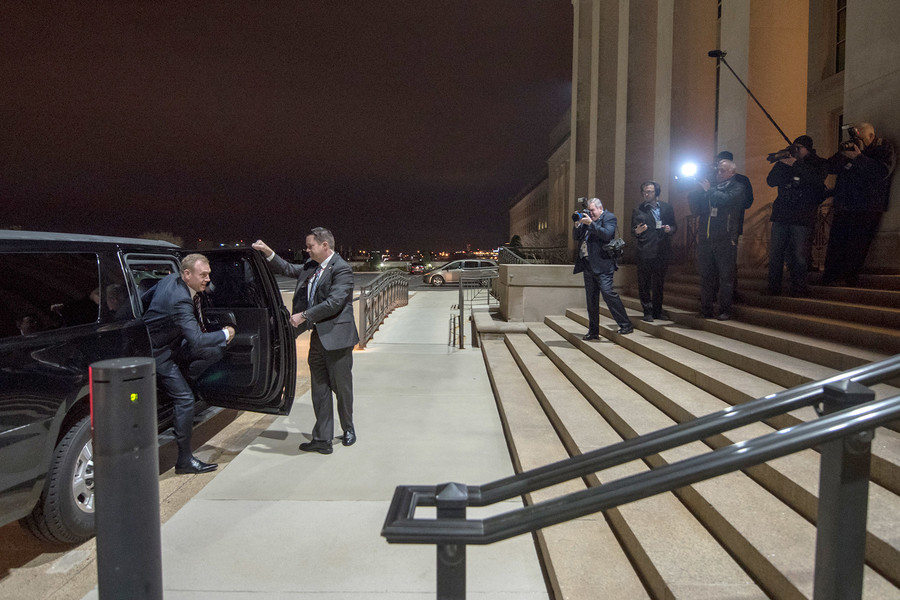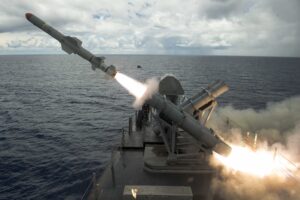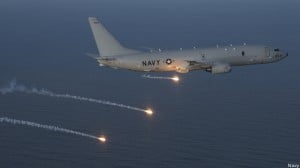By PAUL MCLEARY
 PENTAGON: In his first day on the job, acting Defense Secretary Patrick Shanahangathered civilian leaders of the military services to deliver a simple message: “China, China, China.”
PENTAGON: In his first day on the job, acting Defense Secretary Patrick Shanahangathered civilian leaders of the military services to deliver a simple message: “China, China, China.”
Chinese missile ranges. Graphic by Center for Strategic & International Studies (click to expand)
The comments, shared with reporters Wednesday by a defense official, came as the department continues to reposition forces and refocus modernization programs to meet the rising military prowess of China and Russia — but China’s stronger economy means Beijing is pulling ahead of Moscow in upgrading its forces and hacking US defense firms and government agencies to steal innovative technologies.
 Shanahan’s marching orders come just weeks before the Pentagon’s 2020 budgetis due to be released, which will provide the most tangible evidence of where the department is heading. Shanahan played a central role in putting together the budget, as well as spending much of his time as Mattis’s deputy focusing on cyber initiatives and acquisition reform.
Shanahan’s marching orders come just weeks before the Pentagon’s 2020 budgetis due to be released, which will provide the most tangible evidence of where the department is heading. Shanahan played a central role in putting together the budget, as well as spending much of his time as Mattis’s deputy focusing on cyber initiatives and acquisition reform.
But budget shifts take years of work, and in many way, the change towards countering China as a top priority is already well underway. It predates the Trump administration, with President Obama’s Defense Department having called for a military-diplomatic “pivot to Asia.” Back in January, then-Secretary Mattis released a National Defense Strategy prescribing a new focus on “great power competition” with Russia and China — but with China clearly singled out as the greater long-term threat.
 The Littoral Combat Ship USS Coronado launches a Harpoon anti-ship missile during a test off Guam. The Navy is now equipping its submarines with the underwater-launched version of the Harpoon for the first time in decades.
The Littoral Combat Ship USS Coronado launches a Harpoon anti-ship missile during a test off Guam. The Navy is now equipping its submarines with the underwater-launched version of the Harpoon for the first time in decades.
Much of the evidence is at sea, fittingly for a theater dominated by the vast Pacific. Last month, the Navy posted a notice that it would begin arming its attack submarines with ship-killer missiles for the first time in decades. The service said it was entering into negotiations with Boeing to refurbish and recertifyHarpoon anti-ship missiles for Los Angeles-class subs. (Shanahan spent 31 years working for Boeing until heading for the Pentagon in 2017, but he’s recused himself from all decisions involving his former employer). The armaments upgrade marks a major shift after decades in which submarines focused on projecting power ashore — stealthily collecting intelligence or launching Tomahawk Land-Attack Missiles (TLAMs) — with their only anti-ship weapons being their rarely-used torpedoes.
But with Chinese ships pushing farther out to sea, and new generations of submarines and surface ships being pumped out of Chinese shipyards at breakneck speed, the Navy has been working to beef up presence and develop new combat capabilities to stay abreast of Beijing.
A big part of understanding the threat, however, is being able to see it. The Navy’s civilian chief Richard Spencer said last month he’s considering deploying submarine-hunting P-8 Poseidon aircraft to a small airstrip hundreds of miles off the Alaskan coast, signaling a new emphasis on keeping watch over Russian and Chinese moves in the Arctic.
A remote runway on the island of Adak in the Aleutian island chain, formally known as Naval Air Facility Adak, “is in great shape,” Spencer told me after a joint hearing of the Senate subcommittees on sea power and readiness.
The Navy would have to clean up one of the hangers, but the airport “has a fuel farm up there that Air Alaska is using to fuel its planes, it has de-icing platforms that we could use for freshwater washdowns for the P-8,” Spencer said. “They have lodging up there that is supposedly coming forward to us on a rental availability, so it really isn’t a big bill.”
P-8 Poseidon
 Shanahan had described his tenure as Mattis’ deputy as focusing on the “down and in” aspects of running the bureaucracy, like streamlining procurement and standing up a Space Force. Meanwhile Mattis focused on “up and out” duties like reassuring allies and running interference with the Trump White House. With his elevation to secretary, Shanahan must about-face to act as the Pentagon’s point man with the White House and overseas allies.
Shanahan had described his tenure as Mattis’ deputy as focusing on the “down and in” aspects of running the bureaucracy, like streamlining procurement and standing up a Space Force. Meanwhile Mattis focused on “up and out” duties like reassuring allies and running interference with the Trump White House. With his elevation to secretary, Shanahan must about-face to act as the Pentagon’s point man with the White House and overseas allies.
For now, Pentagon comptroller David Norquist — who ran the department’s first-ever audit, a colossal undertaking — will serve as deputy. There’s no evidence that Trump has yet decided whether to keep Shanahan as secretary indefinitely or nominate another secretary soon.
In a statement on Tuesday hours after shortly after taking the job, Shanahan began by saying the Defense Department operated “under the direction of President Trump” and went on to say he looked “forward to working with President Trump to carry out his vision.” That’s a marked contrast to Mattis, who never mentioned Trump in his farewell missive to the Defense Department’s almost three million personnel.
The acting defense chief’s comments come as the White House hashes out details with Pentagon leadership about withdrawing the 2,000 American troops from Syriaand halving its commitment in Afghanistan — the same Trump plans that prompted Mattis to quit. It is also the surest sign yet that the president is intent on fulfilling campaign promises to defy establishment elites and move away from the grinding counterinsurgency fights that have dominated military thinking for 17 years.
Shanahan is slated to participate in a cabinet meeting at the White House on Wednesday.
Here’s the full text of Shanahan’s Tuesday morning statement:
Statement From Acting Secretary of Defense Patrick M. Shanahan
Under the direction of President Trump, the Department of Defense remains focused on safeguarding our nation. We have deep respect for Secretary Mattis’ lifetime of service, and it has been a privilege to serve as his deputy secretary.
As acting secretary of defense, I now look forward to working with President Trump to carry out his vision alongside strong leaders including the service secretaries, the Joint Chiefs of Staff, the combatant commanders, and senior personnel in the Office of the Secretary of Defense.
The Department of Defense continues to be one of our nation’s bedrock institutions. Our foundational strength lies in the remarkable men and women who volunteer to serve our country and protect our freedoms, while making immense personal sacrifice. It is an honor to work with such a dedicated team committed to the greatness of our nation.
No comments:
Post a Comment